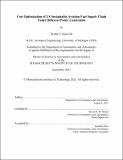Cost Optimization of US Sustainable Aviation Fuel Supply Chain Under Different Policy Constraints
Author(s)
Kelso III, Walter T.
DownloadThesis PDF (5.062Mb)
Advisor
Barrett, Steven R. H.
Terms of use
Metadata
Show full item recordAbstract
This thesis quantifies the costs and emissions of a potential sustainable aviation fuel supply chain in the US in 2035 while incorporating regional uncertainty analysis. Feedstock availability is quantified using projected arable land availability, agricultural yields, and projected waste and residue availability. A mixed-integer linear programming model was developed to minimize supply chain costs, subject to uncertain variables which were analyzed using Monte Carlo simulations. Under a baseline set of assumptions, an average of 78% of 2035 US jet fuel demand can be met with sustainable aviation fuels. The optimization model is applied using inputs from four socioeconomic scenarios to meet 25% and 50% of projected 2035 demand. The sensitivity of the results to a carbon emissions cost of 100 $/tonne CO₂e is also evaluated. Under a baseline set of assumptions, when 50% of 2035 US demand is offset, sustainable aviation fuel is produced with 50% higher costs and 39% lower emissions than conventional jet fuel. In all scenarios, the introduction of a 100 $/tonne CO₂e carbon emissions cost resulted in optimized supply chains using feedstocks and pathways with lower life cycle emissions but higher capital costs.
Date issued
2021-09Department
Massachusetts Institute of Technology. Department of Aeronautics and AstronauticsPublisher
Massachusetts Institute of Technology